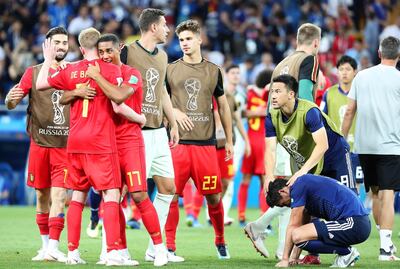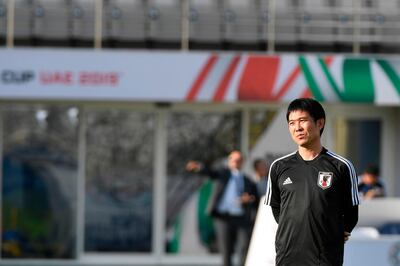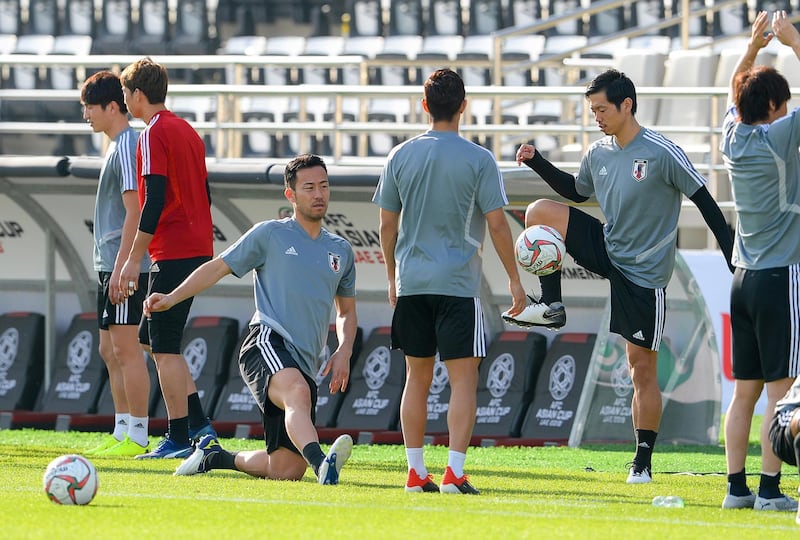Japan, who make their Asian Cup bow on Wednesday, are entitled to be welcomed into the tournament with some grateful applause.
They flew Asia’s flag for longer than anybody at last year's World Cup – alone of the five AFC representatives in the knockout round. They were so close to making it to the quarter-finals, too.
If Japan can bring the verve of the seesaw last-16 tie against Belgium in Rostov six months ago into this showpiece, more applause will be guaranteed. They came within 20 minutes of making the last eight of a World Cup full of thrilling contests in perhaps the most dramatic contest of all.
The underdogs had contained the competition’s eventual bronze medallists through the first half. With two excellently engineered goals, from Geni Haraguchi and Takashi Inui, they stunned Belgium. At 2-0 up with a little more than 20 minutes to go, they seemed ready to stun all expectations.
What happened after that still preys on the minds of many who were involved. Although the make-up of the team is substantially changed since then, manager Hajime Moriyasu remembers vividly watching the agonising turnaround from the bench.
He was assistant to Akira Nishino at the time. They both learned lessons.
Japan were first brought to level terms by Belgian height – headed goals from crosses were conceded in the 69th and 74th minutes – and then, perhaps, by a lack of composure. The goal that beat them, Belgian's late third, came from a swift counter-attack after Japan had committed numbers forward to chase a winner of their own from a corner, deep into stoppage time.

The journey from elation to despair had been swift and brutal.
The curious thing about Japan’s exit from Russia was that they left the tournament conceding that, at the very least, they had been a little too gung-ho.
That was not the posture they had shown to reach the knockouts, when the coaching staff instructed the players to try to maintain a 1-0 defeat in their final group match against Poland. This, rather than chase an equaliser and risk conceding another against a Polish side already out of contention.
They reckoned, dangerously, on there being no change to the equation in the other match, a 2-2 draw played simultaneously between Senegal and Colombia. In that, Nishino got lucky.
Japan only made it through because they had a cleaner disciplinary record over the three group games than the Senegalese, with whom they were exactly matched on goal difference and head-to-head records.
Thus the enigma of Japan at last year’s World Cup: cautiously unambitious to the point of perversity in one cliffhanger scenario; too wild in the next. Which of those Japans to expect in Abu Dhabi on Wednesday?
Against Turkmenistan, a full 77 places below the 'Blue Samurai', the proactive version can probably be anticipated, and this looks like the version Moriyasu wants to cultivate.
______________
Read more:
Lowdown: How the Asian Cup champions have fared in their respective title defences
In pictures: UAE players training ahead of the continental showpiece in Abu Dhabi
Lowdown: Groups, teams, tickets and all you need to know about the tournament
In pictures: Look back on the last time the Emirates host the Asian Cup in 1996
Son Heung-min can ignite South Korea: Five men to watch in the tournament
______________

Japan have scored 15 goals in their five matches since Russia, including four in a seven-goal seesaw friendly win over Uruguay in October. This endorsed some of the updating of the squad the new manager has overseen.
Keisuke Honda retired from international football. Other doyens such as Shinji Kagawa and Shinji Okazaki no longer command first-team places at their clubs, Borussia Dortmund and Leicester City, and have not been summoned to the Asian Cup.
Instead, creative strategy is pinned on younger talents, such as Takumi Minamino, 23, and Ritsu Doan, 20.
That Shoya Nakajima, another emerging star, sustained an injury last month is a setback. Moriyasu will therefore hope that the likes of Inui, Gaku Shibasaki and Yoshinori Muto can shake off the underwhelming domestic seasons they have endured with their clubs – Real Betis, Getafe and Newcastle United – since the World Cup.
“We have brought in some fresh blood," Moriyasu said, “and this is an opportunity for some of the younger players to make international names for themselves. But we still have a good blend of experience as well.
"We need to respect every rival, and start at 100 per cent of our capacities."






